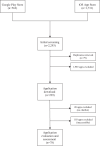Health-focused conversational agents in person-centered care: a review of apps
- PMID: 35177772
- PMCID: PMC8854396
- DOI: 10.1038/s41746-022-00560-6
Health-focused conversational agents in person-centered care: a review of apps
Abstract
Health-focused apps with chatbots ("healthbots") have a critical role in addressing gaps in quality healthcare. There is limited evidence on how such healthbots are developed and applied in practice. Our review of healthbots aims to classify types of healthbots, contexts of use, and their natural language processing capabilities. Eligible apps were those that were health-related, had an embedded text-based conversational agent, available in English, and were available for free download through the Google Play or Apple iOS store. Apps were identified using 42Matters software, a mobile app search engine. Apps were assessed using an evaluation framework addressing chatbot characteristics and natural language processing features. The review suggests uptake across 33 low- and high-income countries. Most healthbots are patient-facing, available on a mobile interface and provide a range of functions including health education and counselling support, assessment of symptoms, and assistance with tasks such as scheduling. Most of the 78 apps reviewed focus on primary care and mental health, only 6 (7.59%) had a theoretical underpinning, and 10 (12.35%) complied with health information privacy regulations. Our assessment indicated that only a few apps use machine learning and natural language processing approaches, despite such marketing claims. Most apps allowed for a finite-state input, where the dialogue is led by the system and follows a predetermined algorithm. Healthbots are potentially transformative in centering care around the user; however, they are in a nascent state of development and require further research on development, automation and adoption for a population-level health impact.
© 2022. The Author(s).
Conflict of interest statement
The authors declare no competing interests.
Figures
References
-
- Government of Japan et al. Tokyo Declaration on Universal Health Coverage: All Together to Accelerate Progress towards UHC. https://www.who.int/universal_health_coverage/tokyo-decleration-uhc.pdf (2017).
-
- World Health Organization & UNICEF. Declaration of Astana: Global Conference on Primary Healthcare. https://www.who.int/teams/primary-health-care/conference/declaration (2018).
-
- World Health Organization. WHO: Framework on Integrated people-centred health services. WHO: Service Delivery and Safety.https://www.who.int/servicedeliverysafety/areas/people-centred-care/stra... (2016).
-
- National Cancer Institute. Health Information National Trends Survey. https://hints.cancer.gov/view-questions-topics/question-details.aspx?PK_... (2019).
-
- Silver, L. & Johnson, C. Internet Connectivity Seen as Having Positive Impact on Life in Sub-Saharan Africa: But Digital Divides Persist. https://www.pewresearch.org/global/2018/10/09/internet-connectivity-seen... (2018).
Publication types
LinkOut - more resources
Full Text Sources



